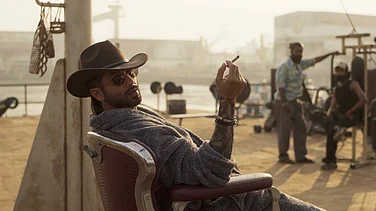Rajshree Ojha has been one of the very film filmmakers who have taken their sweet time in order to come up with projects. She has time and again given the industry some stories that people will remember for ages. From ‘Aisha’, featuring Sonam Kapoor and Abhay Deol, to ‘Chaurahen’, featuring Soha Ali Khan and Zeenat Aman, Ojha has been constantly working with some of the best actors in the film industry.
With the advent of the OTT world, she has also taken a deep dive into making one of India’s most popular urban sitcoms – ‘Potluck’. After a successful first season, the show returned last month with its second season. The new season was equally loved by audiences and fans are hoping to see the next season soon enough.
Talking to Prateek Sur, Rajshree Ojha opens up about the sleeper hit ‘Potluck’, the prospects of it having a next season, its similarity to the Hollywood sitcom ‘Home Economics’, and lots more. She even opens up about how the show is introducing new concepts like DINK to the Indian populace. Excerpts from the candid chat:
‘Potluck 2’ has got great reviews. The show has been a sleeper hit just like the first season. Have you already got a green light for the 3rd season?
Yes, we have. And we are currently in the early stages of development.
You’ve narrated the story from the angle of the girl in the family, played by Shikha Talsania. Was it a conscious choice to not narrate the story from the angle of maybe one of the brothers?
Yes, it was a conscious choice because she is the writer. She is the one who has come back and is having the biggest change in her life in the first season. Because she is the writer and writing her book. It is through her eyes that we see the rest of the family and their experiences.
Many reviewers have also pointed out that ‘Potluck’ bears resemblance to the Hollywood show ‘Home Economics’, which also is a story about 3 siblings and their travails with issues of adulthood. Did you draw inspiration for ‘Potluck’ from ‘Home Economics’?
I'm actually not familiar with ‘Home Economics’, so I have no idea. But yes, I did draw inspiration from other sitcoms around. For example, there was another show which had a father and two siblings. I don't remember the name of it, but it was a really fun show. It had great actors. There was another show but it was discontinued. And I've been watching a lot of American sitcoms, interesting, complex shows here and there.
Every character of ‘Potluck’ is so very relatable to the urban populace. But do you think the rural or the small-town audience also connects to the show equally?
I don’t know, they may connect to a certain extent. I think every person will connect with the situation, and that's what the show is about. It's not about winning over the family or anything like that. It is very inspirational. Although, the story is very urbane but they will connect with the situation. The situation wherein there is a father who is trying to bring the family together. So, yes, I think to a certain extent.
The concept of DINK (Double Income No Kids) is something that’s not very commonly known. Do you think audiences in other parts of India are open to accepting this concept openly?
Yes, I think so. All across India, especially in urban cities like Mumbai, Bangalore, and Chennai, where technology is booming, it's becoming increasingly common for people to live within this concept. People are trying to adopt this concept.
Even when you directed ‘Aisha’, you introduced some concepts that were quite new for Indian audiences. In a time when everyone is running after sequels, why did we never get to see a sequel?
The movie is based on Jane Austen’s book ‘Emma’. And there is no sequel to the book. Because the story was complete in one movie. There was no need for a sequel. I have no plans to do a sequel. I am currently focusing on other projects.
While the film and its music became a hit among the audiences, it was plagued by the problems on sets between Sonam Kapoor and Abhay Deol. As a director, did you ever feel any problems on the sets of the movie?
No, I did not face any such problems on the sets of ‘Aisha’. I was much younger, I did not focus on their personal issues. I was focused on making the best movie possible, and that was my priority. It was my first film I wanted to make the best of it.
As you’ve been in the film industry for almost 2 decades now, you would be the perfect person to answer this. Over the years have you seen any changes in women's demography on the sets?
Yes, there have been a lot of changes. Women are being expected to take on more powerful roles in decision-making positions. We are seeing more female directors, but we still don't see enough women's stories being told. The change is very minute. The change is slow, but it's happening. We are still being bracketed that this audience is for the male-centric or urban-centric, which needs to change. It's great to hear words like women empowerment. But it is really not coming into the world of Cinema. I haven’t seen any change in the last decade.
I remember there was a time when the actress was the only woman on the entire set. Do you see that having changed now? Do you try and have more women on sets of the projects that you’re making?
I think that has changed dramatically. There are a lot of Women ADs. I personally prefer a female assistant. I like having young girls as assistants because they have a great sense of aesthetics. Not like men can’t do it. But I feel more comfortable around women. A lot of young girls are coming in, they aspire to be directors and cinematographers. This is the change I have seen in the last few years. Before that, I hadn’t seen lots of young women who are trying to come in from all walks of life. Earlier there were women coming in but they were mostly restricted to the upper or upper middle class. But now there are girls from small towns who are coming into the industry.
There was also a time when a film set wasn’t considered a safe space for a woman. Actresses or even female junior artists used to be accompanied by their parents or a guardian on sets. Are the new age film or OTT show sets different and safer for women in that respect?
I wasn’t born when that was happening. Since the time I have joined the industry, I have always found it to be safe for women. I have been working in that kind of environment. I have always seen independent women on set. It is not an unsafe place. The set of 'Aisha' was a very safe, family-oriented thing. I have never had any issues.
Also, in these many years, has the audience changed? Are they more open to different types of stories nowadays?
Of course, the audience has changed dramatically. Two years ago, it was a different audience, now they are open to different kinds of films and shows. The audience change due to the political and geopolitical systems of the country. They have more options now. The younger audience is more attuned to personal choices which they get on OTT.
What next can we see coming from your end?
My upcoming film projects include a modern retelling of Jane Austen's first book, ‘Sense And Sensibility’, which focuses on the journey of two sisters with contrasting personalities - one being sensible and the other impulsive. This Gen Z adaptation, titled ‘BaeWajah’, is something I'm particularly excited about. In addition to this, I am also working on ‘Potluck 3’, though I would love to share more details about the plot and genre of this film at a later time.



























